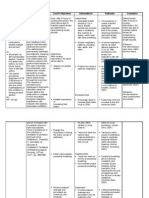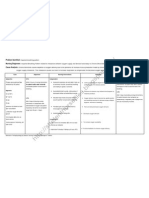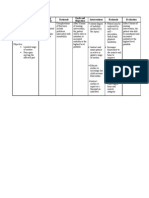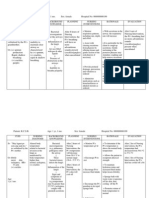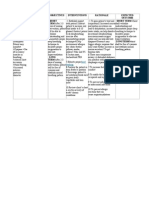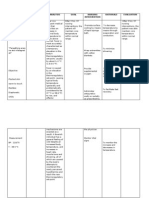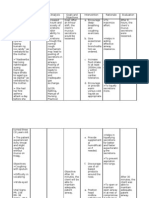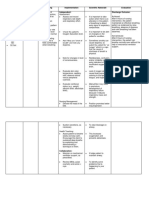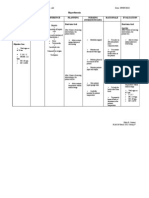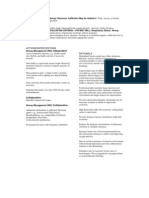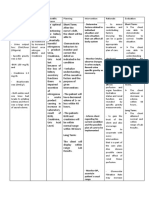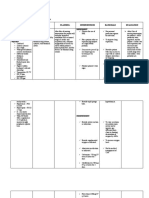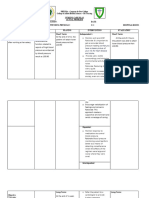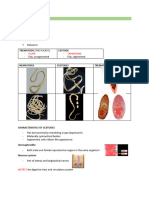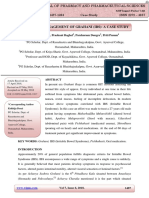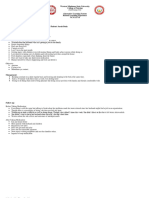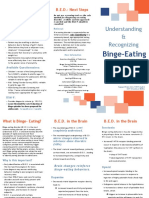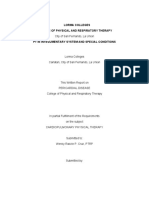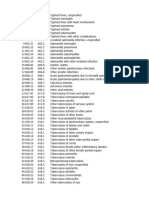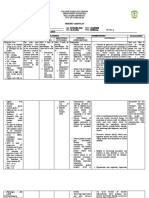0 ratings0% found this document useful (0 votes)
371 viewsNCP Copd
NCP Copd
Uploaded by
Joshua ValdrizThe nursing care plan addresses a patient with COPD experiencing acute respiratory distress. The plan involves administering oxygen, proper positioning, breathing exercises, and medications to lessen breathing difficulties within an hour. Maintaining a quiet environment and adequate rest while giving specific treatments and medications aims to improve gas exchange and comfort the patient's breathing. Evaluation shows the patient's breathing is less strained and they are coping well with the implemented care.
Copyright:
© All Rights Reserved
Available Formats
Download as DOCX, PDF, TXT or read online from Scribd
NCP Copd
NCP Copd
Uploaded by
Joshua Valdriz0 ratings0% found this document useful (0 votes)
371 views4 pagesThe nursing care plan addresses a patient with COPD experiencing acute respiratory distress. The plan involves administering oxygen, proper positioning, breathing exercises, and medications to lessen breathing difficulties within an hour. Maintaining a quiet environment and adequate rest while giving specific treatments and medications aims to improve gas exchange and comfort the patient's breathing. Evaluation shows the patient's breathing is less strained and they are coping well with the implemented care.
Original Title
ncp copd
Copyright
© © All Rights Reserved
Available Formats
DOCX, PDF, TXT or read online from Scribd
Share this document
Did you find this document useful?
Is this content inappropriate?
The nursing care plan addresses a patient with COPD experiencing acute respiratory distress. The plan involves administering oxygen, proper positioning, breathing exercises, and medications to lessen breathing difficulties within an hour. Maintaining a quiet environment and adequate rest while giving specific treatments and medications aims to improve gas exchange and comfort the patient's breathing. Evaluation shows the patient's breathing is less strained and they are coping well with the implemented care.
Copyright:
© All Rights Reserved
Available Formats
Download as DOCX, PDF, TXT or read online from Scribd
Download as docx, pdf, or txt
0 ratings0% found this document useful (0 votes)
371 views4 pagesNCP Copd
NCP Copd
Uploaded by
Joshua ValdrizThe nursing care plan addresses a patient with COPD experiencing acute respiratory distress. The plan involves administering oxygen, proper positioning, breathing exercises, and medications to lessen breathing difficulties within an hour. Maintaining a quiet environment and adequate rest while giving specific treatments and medications aims to improve gas exchange and comfort the patient's breathing. Evaluation shows the patient's breathing is less strained and they are coping well with the implemented care.
Copyright:
© All Rights Reserved
Available Formats
Download as DOCX, PDF, TXT or read online from Scribd
Download as docx, pdf, or txt
You are on page 1of 4
LORMA COLLEGES CON TEMPLATE
NURSING CARE PLAN
RELATED NURSING EXPERIENCE
STUDENT NAME: Valdriz Joshua B.. ROTATION: 1ST ROTATION AREA:
YR LEVEL & SEC: BSN-III Jean Watson DATES: 14 15 16 21 22 23 28 CLINICAL INSTRUCTORS: Sir Randy B. Sandoval
PROBLEM: COPD exacerbations DIAGNOSIS: COPD
PRIORITIZATION: Relief of difficulty of breathing DATE: 09/10/20
ASSESSMENT DIAGNOSIS PLANNING IMPLEMENTATION RATIONALE EVALUATION
Subjective Ineffective airway Within a minute of Assess the vital Assessing the vital Patients vital signs has
“The patient has a breathing related to nursing intervention signs of the patient. signs of the patient a little improvement
long history of increased product of patients difficulty of Assist the client in to know if there’s unlike before. Patient
cardiopulmonary secretions breathing will be proper positioning. changes. Proper knows the proper
problems with lessened Perform a proper positioning will position in order to
chronic productive breathing exercise. lessen the difficulty breath comfortably.
cough and had Apply bedside of breathing. Proper Patient has knowledge
been diagnosed a spirometry. Apply breathing exercise to do proper breathing
having COPD about chest x-ray. Apply will promote comfort. exercise. Patient knows
15 yrs ago.” 12 lead ECG. Bedside spirometry more about his
As verbalized by the Sputum GS-CS. Due to determine once conditions results of his
son of the patient. meds given. you breath it test. The patient is able
Objective distinguish if you to take medicine prior to
VS: BP: have a problem. the doctors order.
140/90mmHg ECG to detect if
RR: 35bpm, HR: there’s a problem in
145bpm, TEMP: your heart related to
37⁰C. ABG values breathing. Sputum
35% venturi mask culture if the sputum
pH 7.31, PaCO2 produces a
92mmHg, HCO3-46 microorganisms.
mEq/L, PaO2 Specific medications
52nmmHg, Sa O2 prior to the
82%, Hmg 13g%. condition.
LORMA COLLEGES CON TEMPLATE
NURSING CARE PLAN
RELATED NURSING EXPERIENCE
STUDENT NAME: Valdriz Joshua B. ROTATION: 1ST ROTATION AREA:
YR LEVEL & SEC: BSN-III Jean Watson DATES: 14 15 16 21 22 23 28 CLINICAL INSTRUCTORS: Sir Randy B. Sandoval
PROBLEM: Confused and disoriented DIAGNOSIS: COPD
PRIORITIZATION: relief of confusion and disorientation DATE: 09/10/20
ASSESSMENT DIAGNOSIS PLANNING IMPLEMENTATION RATIONALE EVALUATION
Subjective Disturbed processes within a minute of Explaining to the In order for the client The patient is able to
“When I got to see related to his nursing intervention client about his to have knowledge relieve confusion and
my father I realized disease the patient will able disease. Advised about his disease disorientation. The
that he was very to relief his confuse patient to perform and in order to not patient understands
confused and and disoriented. breathing exercise. get confused about what is happening to his
disoriented.” As Explain to the client his situation. Proper situation. The patient
stated by the the following breathing exercise is has knowledge to
patients son. implementation that a part in order to improve his condition.
Objective they will do to him. promote relaxing The patient is able to
Moderately Advised the client to condition to the keep relax.
overweight, barrel do some healthy life client. Build trust-
chest, cyanotic, practices. Provide a relationship to client
frequent weak quiet environment to and the nurse in
cough, gray yellow the client. Avoid order for the
sputum with each visitors. intervention to apply
cough, used successfully. In
accessory muscles, order for the client to
pursed lip breathing have more
3+ pitting edema of knowledge. Quiet
legs ankles and feet. environment to
Distended veins. make the client feel
safe.
.
LORMA COLLEGES CON TEMPLATE
NURSING CARE PLAN
RELATED NURSING EXPERIENCE
STUDENT NAME: Valdriz Joshua B.. ROTATION: 1ST ROTATION AREA:
YR LEVEL & SEC: BSN-III Jean Watson DATES: 14 15 16 21 22 23 28 CLINICAL INSTRUCTORS: Sir Randy B. Sandoval
PROBLEM: Acute respiratory distress DIAGNOSIS: COPD
PRIORITIZATION: DATE: 09/10/20
ASSESSMENT DIAGNOSIS PLANNING IMPLEMENTATION RATIONALE EVALUATION
Subjective Impaired gas Within an hour of Administer oxygen. Administer oxygen n The patients breathing
“I could not take a exchange related to nursing intervention Proper breathing order to promote is lessened unlike
deep breath.” As related to altered the patients exercise. Proper comfort breathing. before, the patient is
verbalized by the oxygen supply or breathing will be positioning of the Proper positioning of coping up well.
patient. obstruction of lessened. client. Provide the clients in order to
Objective airways by secretion adequate rest. Keep breath comfortably.
VS: BP: bronchospasm. the environment Adequate rest while
140/90mmHg quiet. Due meds doing the proper
RR: 35bpm, HR: given. positioning. Quiet
145bpm, TEMP: environment may
37⁰C. ABG values ease the condition of
35% venturi mask the patient. Specific
pH 7.31, PaCO2 medications given.
92mmHg, HCO3-46
mEq/L, PaO2
52nmmHg, Sa O2
82%, Hmg 13g%.
You might also like
- NCP FinalDocument5 pagesNCP FinalVenus BonglayNo ratings yet
- ANOLIN, Marc Edriann T. Nursing Care Plan Assessmen T Diagnosis Rationale Planning Interventio N Rationale EvaluationDocument2 pagesANOLIN, Marc Edriann T. Nursing Care Plan Assessmen T Diagnosis Rationale Planning Interventio N Rationale EvaluationEdrianne Tui100% (2)
- Problem: Viii. Planning (Nursing Cre Plan)Document10 pagesProblem: Viii. Planning (Nursing Cre Plan)Raidis PangilinanNo ratings yet
- NCP BMDocument1 pageNCP BMSourabh MehraNo ratings yet
- NCPDocument3 pagesNCPNikki del Rosario100% (2)
- Impaired Breathing PatternDocument1 pageImpaired Breathing PatternHanya Bint PotawanNo ratings yet
- NCP Anemia LongDocument6 pagesNCP Anemia LongJudeLaxNo ratings yet
- Nursing Care Plan On HypertensionDocument5 pagesNursing Care Plan On Hypertensionbhavana100% (1)
- Far Eastern University Nursing Care Plan Nursing Diagnosis Analysis Goals and Objectives Intervention Rationale EvaluationDocument1 pageFar Eastern University Nursing Care Plan Nursing Diagnosis Analysis Goals and Objectives Intervention Rationale EvaluationSarah CarreteroNo ratings yet
- NCP of PnuemoniaDocument13 pagesNCP of PnuemoniaFrando kenneth100% (1)
- Ineffectuve Breathign PatternDocument2 pagesIneffectuve Breathign PatternDiana Marie Magango FranciaNo ratings yet
- 3 NCP AsthmaDocument6 pages3 NCP AsthmajaninenicoleNo ratings yet
- NCP'SDocument10 pagesNCP'SEjie Boy IsagaNo ratings yet
- Nursing Diagnosis Nursing Intervention Rationale Exchange: Prioritized Nursing Problem For AtelectasisDocument7 pagesNursing Diagnosis Nursing Intervention Rationale Exchange: Prioritized Nursing Problem For AtelectasisJinaan MahmudNo ratings yet
- Cholecystitis NCPDocument6 pagesCholecystitis NCPDaud NasirNo ratings yet
- NCPpneumoniaDocument3 pagesNCPpneumoniamykat19No ratings yet
- Assessment Diagnosis Objectives of Care Intervention Rationale Evaluation Difficulty of Breathing (Rapid and Shallow)Document1 pageAssessment Diagnosis Objectives of Care Intervention Rationale Evaluation Difficulty of Breathing (Rapid and Shallow)Jamaica Leslie NovenoNo ratings yet
- Nursing Care Plan: Lipa City CollegesDocument13 pagesNursing Care Plan: Lipa City CollegesVincent Maralit MaterialNo ratings yet
- Assessment Diagnosis Planning Nursing Intervention Rationale EvaluationDocument2 pagesAssessment Diagnosis Planning Nursing Intervention Rationale Evaluationjennelyn losantaNo ratings yet
- Ineffective Breathing PatternDocument2 pagesIneffective Breathing PatternjuanmarcostaglishNo ratings yet
- Copd - NCPDocument6 pagesCopd - NCPMonique Sacherow BacherNo ratings yet
- NCP-Ineffective Airway ClearanceDocument2 pagesNCP-Ineffective Airway ClearanceTimi BCNo ratings yet
- Cues Nursing Diagnosis Analysis Goal Nursing Intervention Rationale EvaluationDocument5 pagesCues Nursing Diagnosis Analysis Goal Nursing Intervention Rationale Evaluationccchelle14No ratings yet
- Elena Ocyo (Pedia - NCP)Document3 pagesElena Ocyo (Pedia - NCP)elle leliNo ratings yet
- NCP Ineffective Airway ClearanceDocument5 pagesNCP Ineffective Airway ClearanceEmm Estipona HaoNo ratings yet
- NCP IcuDocument2 pagesNCP Icujennelyn losantaNo ratings yet
- NCP 1 1Document10 pagesNCP 1 1Samantha VeraNo ratings yet
- Nursing Care PlanDocument20 pagesNursing Care PlanZamranosNo ratings yet
- NCPDocument3 pagesNCPDyanne BautistaNo ratings yet
- TB, Ineffectivbe Breathing PatternsDocument1 pageTB, Ineffectivbe Breathing PatternsnikkilyceeNo ratings yet
- NCP DobDocument2 pagesNCP DobPaulo GeneraloNo ratings yet
- Nursing Care Plan Assessment Diagnosis Outcome Intervention Rationale EvaluationDocument5 pagesNursing Care Plan Assessment Diagnosis Outcome Intervention Rationale EvaluationMarivic Yuson MalagarNo ratings yet
- "Hindi Ko Kayo Masyadong Marinig Sa Kanang Tenga Ko, Pwede Bang Sa Kaliwang Side Ko Kayo Magsalita?" As Verbalized by The PatientDocument2 pages"Hindi Ko Kayo Masyadong Marinig Sa Kanang Tenga Ko, Pwede Bang Sa Kaliwang Side Ko Kayo Magsalita?" As Verbalized by The PatientMussaib Mushtaq100% (1)
- Ineffective Airway Clearance CareplanDocument6 pagesIneffective Airway Clearance CareplanderreshaNo ratings yet
- CARE PLAN For BRONCHIECTASISDocument8 pagesCARE PLAN For BRONCHIECTASISCecil MonteroNo ratings yet
- AMINOPHYLLINEDocument2 pagesAMINOPHYLLINEmusiclover017100% (1)
- NCP of Difficulty of BreathingDocument2 pagesNCP of Difficulty of BreathingMan GatuankoNo ratings yet
- NCP HyperthermiaDocument2 pagesNCP HyperthermiaKirby ContaoiNo ratings yet
- NCP MeningitisDocument2 pagesNCP MeningitisARISNo ratings yet
- Ineffective Airway ClearanceDocument1 pageIneffective Airway ClearanceVittena Eloisa VibarNo ratings yet
- Rufino, Leslie Kriztel S. BSN 3-2 Group 1Document6 pagesRufino, Leslie Kriztel S. BSN 3-2 Group 1Deinielle Magdangal RomeroNo ratings yet
- Nursing ManagementDocument16 pagesNursing ManagementNica Marie LumbaNo ratings yet
- NCP - Ineffective Airway ClearanceDocument4 pagesNCP - Ineffective Airway ClearanceKim Gabrielle Exene LeeNo ratings yet
- Activity and Case Study RF and RCMDocument2 pagesActivity and Case Study RF and RCMJarda julie DacuagNo ratings yet
- NCP For AsthmaDocument2 pagesNCP For AsthmawaadNo ratings yet
- NCP DobDocument3 pagesNCP DobLester BuhayNo ratings yet
- NCP CopdDocument6 pagesNCP Copdjoelette100% (1)
- Assessment Nursing Diagnosis Planning Nursing Intervention Rationale Evaluation Subjective DataDocument6 pagesAssessment Nursing Diagnosis Planning Nursing Intervention Rationale Evaluation Subjective DataDeinielle Magdangal RomeroNo ratings yet
- Nursing Care Plan Ineffective Airway Clearance Related To Tracheobronchial Secretions CAPDocument2 pagesNursing Care Plan Ineffective Airway Clearance Related To Tracheobronchial Secretions CAPLP Benoza100% (2)
- Nursing Care Plan For Pneumonia NCPDocument2 pagesNursing Care Plan For Pneumonia NCPCelline Isabelle ReyesNo ratings yet
- Nursing Care PlanDocument3 pagesNursing Care Planjnx_anonymousNo ratings yet
- Short TermDocument2 pagesShort TermJamaica Leslie NovenoNo ratings yet
- Nursing Care Plan 1: Diagnosis Goal Nursing Interventions RationaleDocument8 pagesNursing Care Plan 1: Diagnosis Goal Nursing Interventions RationaleTrysna Ayu Sukardi100% (1)
- ETOPOSIDEDocument4 pagesETOPOSIDEkajal guptaNo ratings yet
- Francisco NCPDocument2 pagesFrancisco NCPAlexandria Barbo FranciscoNo ratings yet
- Community Acquired Pneumonia Nursing Care Plan: Demonstrate Pursed-Lip and Diaphragmatic Breathing To The PatientDocument4 pagesCommunity Acquired Pneumonia Nursing Care Plan: Demonstrate Pursed-Lip and Diaphragmatic Breathing To The PatientKrisianne Mae Lorenzo Francisco100% (1)
- Nursing Assessment Nursing Diagnosis Goal Planning Rationale Implementation Evaluation Subjective DataDocument4 pagesNursing Assessment Nursing Diagnosis Goal Planning Rationale Implementation Evaluation Subjective DataDimpal ChoudharyNo ratings yet
- Final Thyroid Storm NCPDocument6 pagesFinal Thyroid Storm NCPoguitekim1No ratings yet
- NCP 092Document10 pagesNCP 092Speedhope Ivan PaasaNo ratings yet
- Askep DialisisDocument6 pagesAskep Dialisisvictor zhefaNo ratings yet
- Z - Ding Cyberknife Vs LinacDocument26 pagesZ - Ding Cyberknife Vs Linacraheel252No ratings yet
- Hidden Killers Human Fungal InfectionsDocument9 pagesHidden Killers Human Fungal InfectionsMonica ScottNo ratings yet
- RK - Corpus Alienum Cornea - Rs BhayangkaraDocument20 pagesRK - Corpus Alienum Cornea - Rs Bhayangkaraamalia sri anjaniNo ratings yet
- Platelet in DengueDocument5 pagesPlatelet in Denguekarina nilasariNo ratings yet
- AppendicitisDocument41 pagesAppendicitispradeepnagdaNo ratings yet
- CESTODESDocument18 pagesCESTODEScatuiraneljhayyyNo ratings yet
- Hematology Application For VetDocument56 pagesHematology Application For Vet郑伟健No ratings yet
- 2019 @radlib Jatin P Shah, Newell PDFDocument567 pages2019 @radlib Jatin P Shah, Newell PDFLaercio Martins100% (3)
- A Comparative Clinical Study of Effect of Dhumapana1Document159 pagesA Comparative Clinical Study of Effect of Dhumapana1Yashwanth S D E&CNo ratings yet
- Article Wjpps 1527921218Document8 pagesArticle Wjpps 1527921218Pavitra Malik DalalNo ratings yet
- BST JSS 2 - WK 1 Lesson NoteDocument3 pagesBST JSS 2 - WK 1 Lesson NoteTriplejayartNo ratings yet
- Referência Bibliográfica Trauma CraniofacialDocument2 pagesReferência Bibliográfica Trauma CraniofacialSamira FreitasNo ratings yet
- Jadwal Pekerjaan Instalasi Penyaluran 500Kv Dan 150 KV Rencana Operasi Bulanan Periode Agustus 2021Document4 pagesJadwal Pekerjaan Instalasi Penyaluran 500Kv Dan 150 KV Rencana Operasi Bulanan Periode Agustus 2021MuhammadHeruSetiawanNo ratings yet
- 2018 Krok2Document10 pages2018 Krok2mohamed esamNo ratings yet
- Case Study HypertensionDocument5 pagesCase Study HypertensionPaul Jolo100% (10)
- Intensive Care Management of The Head Injured Patient: Review ArticleDocument14 pagesIntensive Care Management of The Head Injured Patient: Review ArticlerickyGKNo ratings yet
- NCM 117 - Case Study 1 DarundayDocument19 pagesNCM 117 - Case Study 1 DarundayEzra Miguel DarundayNo ratings yet
- Sinew Surgical Technique PDFDocument8 pagesSinew Surgical Technique PDFLUNA SEQUOIANo ratings yet
- Introduction of PharmacotherapyDocument51 pagesIntroduction of PharmacotherapyJeffrey RamosNo ratings yet
- Stem Cell Therapy: Presented by DR - Ganga.T Jssmc. MysoreDocument42 pagesStem Cell Therapy: Presented by DR - Ganga.T Jssmc. MysorenilshrNo ratings yet
- Understanding and Recognizing Binge Eating Disorder Brochure For NPM 569Document2 pagesUnderstanding and Recognizing Binge Eating Disorder Brochure For NPM 569Ruqayyah Rivera ColinNo ratings yet
- Lorma Colleges College of Physical and Respiratory TherapyDocument33 pagesLorma Colleges College of Physical and Respiratory TherapyAnab Mohamed Elhassan Abbas AlnowNo ratings yet
- MCI FMGE Previous Year Solved Question Paper 2007Document0 pagesMCI FMGE Previous Year Solved Question Paper 2007Sharat ChandraNo ratings yet
- CodexxxDocument486 pagesCodexxxpalpat.cmgNo ratings yet
- Nursing Care Plan Age: 60 Years OldDocument4 pagesNursing Care Plan Age: 60 Years OldLouise GudmalinNo ratings yet
- Emotional Adjustment & Emotions in Health and IlnessDocument12 pagesEmotional Adjustment & Emotions in Health and IlnessBijia KhumanNo ratings yet
- EndometriosisDocument2 pagesEndometriosisIrham KasyfulNo ratings yet
- DiabetesDocument9 pagesDiabetesRagil SaputroNo ratings yet
- Glossary Mental Terms-FarsiDocument77 pagesGlossary Mental Terms-FarsiRahatullah AlamyarNo ratings yet
- Care For Children Knowledge ReviewsDocument3 pagesCare For Children Knowledge ReviewsHannah PearsonNo ratings yet




